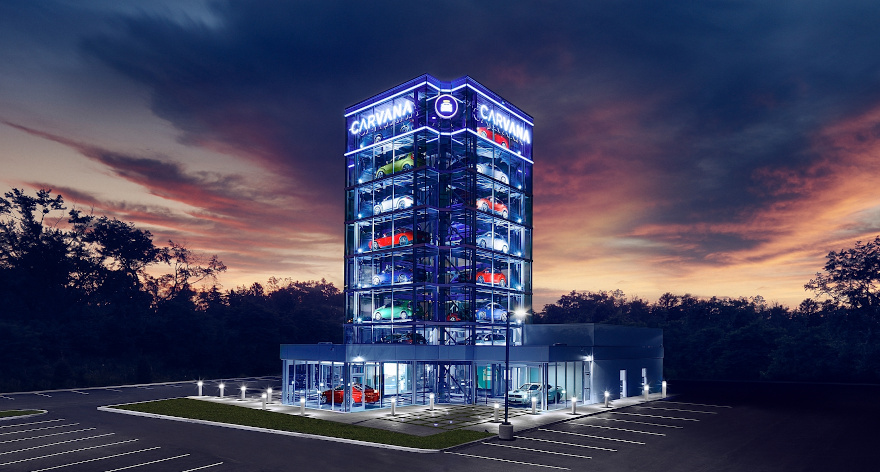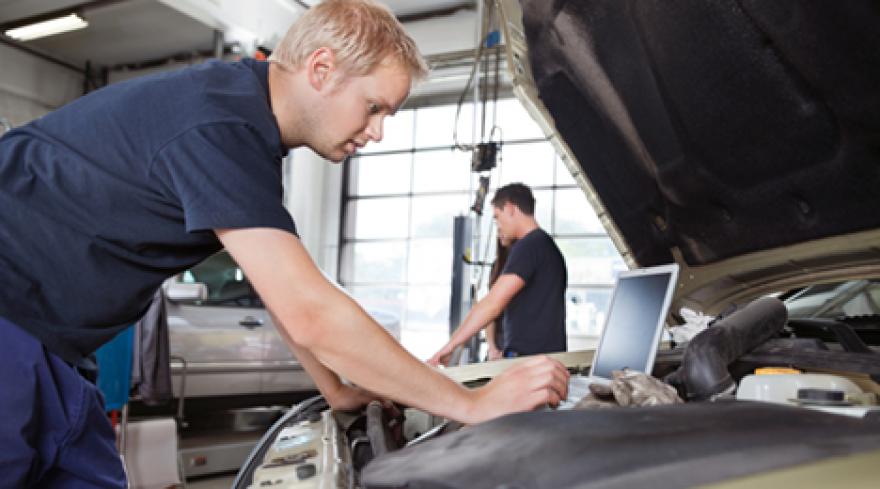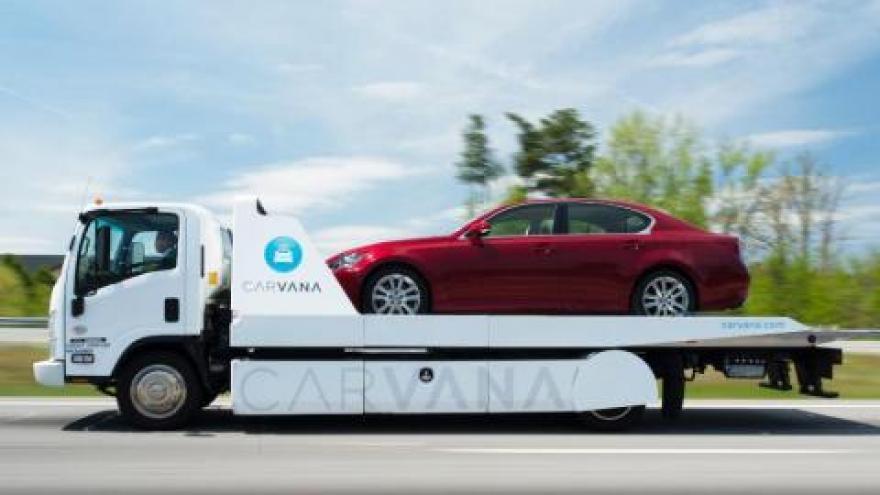The Carvana customer takes a commemorative, oversized coin to activate the vending process, and then the vehicle descends an all-glass tower that stands eight stories tall and holds 27 vehicles.
The unveiling of Carvana car vending machines across the United States continues.
Carvana on Wednesday opened its latest vending machine, in Greensboro, N.C. The company uses the machines to offer what it describes as a “one-of-a-kind experience for customers who purchase a vehicle on Carvana.com.”
After choosing a vehicle on the Carvana site, customers can schedule as-soon-as-next-day pickup from a car vending machine or choose to have the vehicle delivered to their home.
Greensboro is Carvana’s third car vending machine location in North Carolina. It is Carvana’s 19th U.S. car vending machine, with the others located in Tennessee, Texas, Florida, Maryland, Arizona, Ohio, Pennsylvania, Indiana, Illinois and Missouri.
Carvana founder and chief executive officer Ernie Garcia said the company first launched in Greensboro in 2018.
“So we’re looking forward to now also offering area residents our signature car vending machine pickup experience,” he said in a news release.
The Greensboro car vending machine is located at 4830 Koger Blvd. and is open Monday through Saturday from 9 a.m. to 7 p.m. eastern time. For all Carvana customers, vehicle pickup at any of Carvana’s car vending machines is free.
Software company Xtime believes the vehicle service experience needs improvement.
Up to this point, the automotive industry has not had the necessary tools to provide on-demand convenience for consumers, according to the company. Poor communication between dealerships and customers has hurt dealership retention and business.
Looking to improve that communication, Xtime is unveiling a new Service Tracker feature that it says will offer customers mobile access to vehicle status updates in real-time. The company says the feature can build greater trust and loyalty between customers and dealers.
In a news release, the company’s vice president and general manager Tracy Fred sourced NADA Data 2018 in noting that service revenue accounts for 49.6% of dealership profits, and Fred added that Xtime’s Service Tracker gives dealers a necessary advantage to compete in a crowded market.
“Service Tracker’s core purpose is to bring trust, communication and transparency to the automotive service industry and ultimately, to keep dealers and their customers happy,” Fred said.
Because of dealers’ lack of tools for on-demand service, advisers in the service department often experience many phone calls and text messages from customers wanting routine service status updates.
That gets in the way of the department satisfying existing customers, according to Xtime. It also means service departments have less time to help other clients standing in the service drive.
Xtime says the following benefits of Service Tracker help dealers meet that challenge head-on:
— Real-time service status: Through a customized URL link provided via email or text message, dealers’ customers can access real-time vehicle service status updates.
— Increased consumer transparency: Xtime says dealerships see an increase in trust and loyalty when their customers know their vehicle’s status throughout the service experience.
— Reduced phone call volume: Because service advisers don’t have to answer as many phone calls, they can focus on other tasks, which Xtime says improves department capacity and the customer experience.
Asbury Automotive Group chief executive officer David Hult said customers checking the status of their vehicles make up about 70 percent of inbound phone calls through the service center.
“We clearly needed a solution that could simultaneously enhance our flow of information with customers and reduce demand on staff,” Hult said. “With the introduction of Service Tracker, customers can independently check the status of their service in real time, allowing advisers to concentrate on the customers in front of them and provide higher levels of service.”
A comprehensive vehicle inspection is an important step toward building trust, transparency and loyalty with customers of Klick-Lewis Chevrolet in Palmyra, Pa., said Warren Lewis of Klick-Lewis Chevrolet.
“Having our Auto/Mate DMS deeply integrated with the Xtime Inspect module makes that critical relationship-building step so much easier and more efficient,” Lewis said in a news release. “Our service staff gets to spend their time meeting customers’ needs, instead of moving data around from one system to another.”
Lewis was talking about the news on Monday from Xtime that its Inspect product has integrated with national dealer management system provider Auto/Mate. Xtime said the integration will help dealers increase the strength of customer relationships and bring more lasting customer retention to the service department.
Because of the integration, dealers using Auto/Mate’s DMS will have use of Xtime’s Inspect module, part of what Xtime describes as “the automotive industry's leading cloud-based service management platform.”
Xtime says that with its Inspect products, dealers can increase shop efficiency and revenue and improve customer satisfaction through the use of digital, multi-point inspections, recommended services and online customer approvals.
Sourcing Phase 2 of the Cox Automotive 2018 Service Industry Study, Xtime noted that approximately 70% of consumers who purchased or leased from a dealer did not return for service in the past year. According to Xtime, that indicates that dealers continue finding customer retention a challenge. But according to that study, more than half of consumers said they would be willing to travel farther and pay more for a better service experience. That creates “an opportunity for dealers to continue to grow their share of total service visits,” according to Xtime.
That’s an area that Xtime says its Xtime Inspect product can help dealers address. Through instant communication with dealership chat, parts pricing and availability information, and centralized access to service history and previous recommendations, it can help dealers streamline the vehicle inspection process internally and externally. Also, from technician to parts to advisor, it provides an integrated quote generation process.
Using its existing integration with Xtime Schedule, Auto/Mate dealers will have the ability to import repair orders into Inspect and have access to real-time parts availability, parts on-hand — with bin and source location — descriptions and more.
Xtime vice president and general manager Tracy Fred said industry headwinds continue disrupting service departments and threatening dealership profitability as a whole.
“Xtime knew it was mission critical to invest in new relationships to ensure the benefits of Inspect were available to as many dealers as possible,” Fred said. “Through the Inspect integration with Auto/Mate, more dealers will have the resources they need to provide a consistent customer experience that offers transparency, confidence and trust every step of the way to create lifelong customers.”
“Xtime’s integration with our parts module will allow parts department users to save time and create more accurate parts quotes, as well as communicate pricing and availability throughout the entire dealership,” said Auto/Mate president and chief executive officer Mike Esposito.
“We have designed our Open/Mate program to expedite the integration process from third-party vendors for a low cost, which increases satisfaction for both parties’ dealership customers,” Esposito said.
Dealer-first automotive digital retail software provider MAX Digital believes competition from non-traditional dealers has never been stronger. Because of that, providing a smooth path to purchase is a must for dealerships to thrive in the coming years.
With that in mind, MAX Digital has partnered with LotVantage, and participating dealers can now combine LotVantage services — such as ad placement on Craigslist, Facebook, eBay and YouTube — with any of the MAX tools for inventory management, digital retailing or showroom collaboration with MAX Syndication.
MAX Digital says its integrations and retail performance management tools help dealerships increase profit on every vehicle transaction. To bring active car shoppers back to the dealership to buy, LotVantage says it boosts dealer presence within key social channels. With its focus on the value segments of marketing, the company says the investment is low relative to the return.
LotVantage says its clients who use the hands-free subscription model of Craigslist and Facebook Marketplace have seen big results, with an average of 30% more lead volume from local buyers.
For dealers, the vendor networks are an important investment toward business growth, MAX Digital executive vice president Mike Cavanaugh said in a news release.
“Making it easy for our dealership partners to take advantage of LotVantage services with MAX feeds that are optimized for merchandising was an obvious win,” Cavanaugh said.
LotVantage president Jim Jabaay said inventory marketing success comes from having the right inventory at the right price to gain online car shoppers’ interest.
“Our MAX Digital clients have high potential vehicles and the detailed package information and collaborative showroom tools to sell them," Jabaay said. “That strong inventory foundation has helped our clients have success generating leads socially and closing them in the showroom. It’s been a win-win-win relationship for us, our dealers and MAX.”
What happens when customers visit a dealer website and inquire about a vehicle? According to the 2019 Pied Piper PSI Internet Lead Effectiveness Benchmarking Study, BMW auto dealerships ranked highest overall in the study, which measured areas such as whether the customer received an email answering his or her question within 24 hours.
Rounding out the top five in the study were dealerships selling Acura vehicles, then Mercedes-Benz, Volvo, and Audi.
The Pied Piper study also looked at how dealerships use texting and website “chat” to interact with website customers. Pied Piper, which develops and runs sales and service programs to improve dealer networks’ performance, found that in replying to a customer’s website inquiry, dealerships sent customers text messages 39% of the time on average. But the dealerships did not score well in the area of first requesting customer permission to send a text. The dealerships participating in the study requested that customer permission only 5% of the time on average.
Discussing the Telephone Consumers Protection Act (TCPA) of 1991, Pied Piper said in a news release that a dealership sending automated texts without the customer’s “express written consent” could be fined $500 to $1,500 per unsolicited text sent.
“Texting is just how we Americans communicate today,” said Pied Piper Management Co. LLC president and chief executive officer Fran O’Hagan. “Most customers are willing to text with dealerships too, but any business must be careful to get permission from customers before texting. Dealers must also watch for salespeople texting from personal cell phones, bypassing dealership CRM systems.”
Pied Piper also said use of website “chat” functions has become common. Seventy-two percent of dealer websites on average promise the ability for customers to immediately chat online with a dealership representative, according to the study. But those chat systems failed to provide a human response within 30 seconds 46% of the time on average.
“Worse than not having chat capability on a website is promising chat but failing to quickly deliver,” O’Hagan said.
Rounding out the top 10 in the study overall were MINI, Toyota, Mazda, Subaru, and Cadillac.
In conducting the study, Pied Piper sent customer inquiries through 9,264 individual dealership websites. Pied Piper asked a question about a vehicle in inventory and provided a customer name, email address and local telephone number.
Then, Pied Piper evaluated how the dealerships responded over the next 24 hours by email, telephone and text message. Pied Piper used 20 different measurements in generating a dealership’s PSI-ILE score.
Whether a customer received an email response of any type — even an automated reply — within 24 hours was the most basic measurement, Pied Piper said. On average industrywide, 8% of customers received no email reply at all.
In measuring whether the customer received an email answer to their question within 24 hours, which Pied Piper said is a more meaningful measurement, BMW, Porsche, Mercedes-Benz, Acura and MINI dealerships were the most likely to come up with an answer within that time, more than 55% of the time on average.
Dealerships selling Ford, Genesis, Buick, Hyundai, GMC and Lincoln didn’t do as well in that area, with those dealerships answering the customer’s question within 24 hours less than 30% of the time on average.
An update to ILE scoring, which increased weighting for the content of a dealership response, was new for the 2019 study. The industry average ILE score declined five points as a result of that, from 57 to 52. ILE scores ranged from zero to 100, and 15% of dealerships nationwide demonstrated an effective website-response process with a score above 80. But 34% of dealerships, with scores below 40, had a tough time responding effectively to today’s website customers.
Pied Piper has conducted its PSI Internet Lead Effectiveness Benchmarking Study annually since 2011. The company conducted the study between July 2018 and May 2019.
Lithia Motors has added Jaguar Land Rover Mission Viejo in California to its network, and the dealership represents Lithia Motors’ first Jaguar Land Rover location. The dealership generated $116 million in revenue in 2018.
Lithia Motors president and chief executive officer Bryan DeBoer said the franchise is a good fit toward the company’s strategy of “acquiring strong businesses that have considerable potential.”
“Our purchase included the highly desirable real estate providing convenience and stability to our customers in this affluent market for decades to come,” DeBoer said in a news release.
He also described the acquisition market as remaining active, and he said his company plans to “expand beyond our current national reach of 80%.”
“Future business adjacencies and new digital technologies will further activate our network by providing solutions that our customers crave,” DeBoer said.
In 2016, global luxury automotive brand Genesis launched its Genesis at Home purchase experience in Canada using automotive industry digital retailing services company Motoinsight’s digital retailing platform MotoCommerce. Motoinsight describes Genesis at Home as a “global industry first” that it said allowed customers to complete the entire purchase process online.
Now, as Genesis expands into the Australian market, the brand will do so with a customer experience from MotoCommerce. Motoinsight said its technology now serves automakers in the United States, Canada and Australia.
Motoinsight said the MotoCommerce platform is a full omni-channel service that integrates online and in-store sales processes into what it describes as “a unified customer journey.” According to the company, that means that through platform, the customer can complete most of the purchase at home, but he or she has the option to also pick up and finish the purchase in-store.
Last week, Genesis Motors Australia opened its Sydney retail boutique, which includes full omni-channel retailing capabilities. Also, Australian customers can now order their Genesis online at Genesis.com.
“Creating a unique customer experience that holds true in a global context was a key priority in the launch of our Genesis brand for the Australian market,” Genesis Motors Australia national marketing manager Linda Fabis said in a news release. “Having witnessed the success of Genesis at Home in Canada, it followed that we would offer that same transparency and convenience to our Australian customers.”
Motoinsight chief executive officer Andrew Tai said customer experience is “the new battleground” in the area of attracting customers.
“And automotive retail is no different,” Tai said. “MotoCommerce has proven to be the leading solution for automakers and dealerships that believe they win by delivering transparency and convenience to customers. We’re proud to share Genesis Motors Australia’s vision in this regard.”
Laughing. You might not think of that as an important aspect of handling sales calls.
But according to a new study, it is. A new report from conversational analytics company Marchex analyzed 6,200 U.S. auto dealership sales conversations in January. The endeavor showed top sales performers laughed during more than half of their calls. Marchex said that helped relax the caller and brought a positive feeling to the call.
That was just one finding of the study, however. The top-performing salespeople used active listening much more than lower-performing sales representatives. Marchex said active listening leads to more dealership visits and more sales.
In a news release, Marchex head of automotive Matt Muilenburg described active listening as being extremely important in making strong connections with prospective car buyers during phone calls.
“The data shows that taking the time to listen and create these high-value experiences increases customer visits to dealerships and ultimately leads to more sales. This is especially critical today when dealer visits are at an all-time low," Muilenburg said.
Requesting the caller’s name. Saying “please” and “thank you.” Those were two other attributes of top sales performers, according to the study. Top sales performers asked for the caller’s name 163% more often than low performers. And 40 percent more often than bottom performers, the top performers provided their direct contact information to callers and also found out the caller’s contact information.
Ninety-nine percent of the time, top performers said “please” and “thank you” compared to 89 percent for lower performers.
The new report is the final installment of the Marchex Institute three-part series on how auto dealerships handle calls. Titled, “2019 Auto OEM Study: How some OEMs are boosting sales at the expense of others,” the initial report that came out in November showed how some OEMs are taking advantage of new data showing the importance of calls in “the path to purchase” for consumers who want to buy a car.
The second report that came out in January analyzed how call handling affects purchasing decisions at car dealerships. The report showed that those answering inbound sales calls strongly influence the likelihood of a caller booking an appointment or showing up at a dealership.
The final installment focuses conversation quality and showing how good salespeople speak with their callers and close more business.
“Did you need third-row seating?” “Are you wanting leather seats?” Top performers ask about caller preferences more often, according to the report: Top performers worked to find out about the caller’s needs and preferences 57% more often than lower-performers.
Questions like that, using what Muilenburg described as “understanding and empathy,” provide important information to the caller and increase sales, Muilenburg said.
“This data helps dealers understand how to deliver empathy at critical moments and capture the interests of the customer over the phone,” he said.
When dealerships value the caller experience, that gives them an edge, according to the report, which stated that callers can hang up the phone and look for a dealership that is more willing to answer their questions. “Dealers who take proactive steps to optimize inbound phone calls know that the conversation is key,” the report states.
That conversation, as mentioned earlier, should include fun.
In calls that included laughter, top performers laughed much more often on the call than bottom performers.
“We can surmise that laughing keeps the call positive and relaxes the caller, two behaviors that likely contribute to the results of top performers,” the report stated.
A new “mobile optimized” car sales platform promises to appeal to the younger generation by bringing together the latest in digital technology to improve the overall car-buying experience and bring dealerships a more efficient and profitable business model.
The platform is called 321 Ignition, and it says that it allows dealerships to bring a “concierge-level customer experience” to millennials. Using artificial intelligence capabilities, 321 Ignition analyzes all parts of the car-buying process, which the company says can bring dealerships and buyers closer together.
The company says the platform keeps digitally focused millennials engaged during the entire process of buying a car. Digitalization and advancements in technology can turn website visits into qualifying leads, and that means customers are more likely to want to visit the dealership. An easier, more engaging, time-saving and convenient car-buying experience, can mean more satisfied and loyal customers and can result in return business, according to the company.
With 321 Ignition, all car-buying productivity tools come built in, and the company says that means an easier customer experience throughout the site without third-party interference or pop-ups. It also makes the experience personalized to the dealership’s brand and personality.
Complete transparency throughout the entire buying process is another advantage of the platform, according to the company. With 321 Ignition, dealers can offer fair, simple and transparent pricing and service structures that customers can understand easily, according to the company.
“Our mobile-first platform brings together all of the latest digital technological advancements to make it a better overall experience for car buyers, while making it a more efficient and profitable business model for dealerships,” 321 Ignition chief executive officer Lyamen Savy said in a news release.
The company says Savy and 321 Ignition CMO DJ Haddad are digital marketing veterans who had the on-the-go generation in mind when building and custom-tailoring the new mobile-first website platform. That means millennial and Gen Z car buyers can receive a higher level of service from dealers, the company said.
“We want to be a forward-thinking dealership and 321 Ignition is helping us appeal to a younger generation,” Sound National Lending general manager Adam Larson said. “We wanted to partner with 321 Ignition because of their innovation and fast-paced background, and we see this partnership lasting for a long time to come.”
Carvana has had a presence in North Carolina since 2014, and some of the online car buying and financing platform’s earliest markets launched in the state, Carvana founder and chief executive officer Ernie Garcia said in a news release.
The company’s North Carolina presence just got bigger.
Carvana on Wednesday launched in four additional markets in the state, offering its services to Asheville, Fayetteville, Wilmington and Hickory.
With the launches, Carvana now offers as-soon-as-next-day vehicle delivery in 137 U.S. cities.
“We’re confident Asheville, Fayetteville, Wilmington and Hickory area residents will enjoy ordering their next car online and having it delivered as soon as the next day,” Garcia said.












